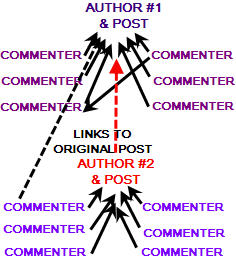 Once weekly I attend Open PD facilitated by Robin Ellis, Darren Draper and Kelly Dumont.
Once weekly I attend Open PD facilitated by Robin Ellis, Darren Draper and Kelly Dumont.
Today’s session — an introduction to blogging — I was invited to share tips on blogging which I decided to expand on a couple of tips by following up with this post.
About Open PD
Open PD is an open staff development course that any teacher, administrator, or technology specialist can join to learn more about the many free, online tools that can be used to enhance your teaching.
 Classes are held once weekly, in five week blocks, with the global participants joining the face-to face participants in Utah, USA using Skype, Ustream and the Open PD wiki. I, like many others, throughly enjoy, and gain so much, from joining these weekly sessions.
Classes are held once weekly, in five week blocks, with the global participants joining the face-to face participants in Utah, USA using Skype, Ustream and the Open PD wiki. I, like many others, throughly enjoy, and gain so much, from joining these weekly sessions.
 Tip #1 – Remember The Conversation
Tip #1 – Remember The Conversation
The most important aspect of blogging, and where the true learning happens, is in the conversations. Always keep sight on how to achieve this conversation!
Conversations happens when you write a reflective post that invites / encourages / evokes readers to express their opinion:
- Readers post their comments in response
- You respond back with your own comments to your readers comments
- If your post, or the comments, invokes sufficient emotion readers expand on their responses in their own post, which will link back to your original post
- And you may follow up your original post with what you have learned from the comments and other posts
Sue Wyatt’s Creating a classroom blog is a classic example of the importance of blogging as a conversation. Sue has just started out blogging and asked for help working out how to blog with students. After reading her post I asked:
- my twitter network to share their tips which they posted in her comments
- Al Upton to share his tips on blogging with students – which he did in Class blogs – management, moderation and protection and Class blogs – personalise your blog, a sequence of settings
- wrote my own post on tips for blogging with students
Blogging conversation like these are powerful because you are drawing from a diverse range of people, from various backgrounds, with a variety of experiences. Each individual shares their differing perceptive leading to greater gain and innovation by all involved.
My personal recommendation is for educators to first start out blogging for themselves; so they gain an understanding of how important these conversations are for the learning process.
Tip #2 – You Are Building a Community
Can’t take credit for this tip! Oops, I had forgotten to talk about the significant of community building in blogging – thankfully Jamie Gustin reminded me.
Conversations happen when you take the time to build a sense of Community. Readers will go out of their way to help and assist you; if they feel part of your community.
Make time to:
- Engage with your readers on your own blog; post comments in response to theirs to show you value their input.
- Visit and comment on other people’s blogs. Blogging isn’t about staying home; it’s about visiting others, engaging in their conversations and taking the time to help them with their learning. Showing you care about others means they are more likely to take the time to help you.
I’m very effective at managing my comments on other people blogs using co.mment — which tracks my comments, and notifies me automatically by sending the comment to my Google Reader account. This way when a person comments on a post that I have commented on I can choose to immediately respond back if I want.
FINAL THOUGHT
The next series of Open PD session start in 2 weeks (5 March) and is available to any one who wants to attend; contact Robin or Darren via the Open PD wiki for more information.
What tips and advice would you give educators who are new to blogging? How do you explain the value of blogging?
If you are enjoying reading this blog, please consider ![]() Subscribing For Free!
Subscribing For Free!
Sue,
Open PD offers a great case study of how social software can engage learners (in this case, they happen to be adults). Your comments in the Open PD video about the value of connecting learners around the globe were spot on. I took the liberty of sharing them in this Spiral Notebook plug for Open PD:
http://www.edutopia.org/social-networking-online-professional-development
Cheers,
Suzie
This is a great post. I’m linking you. I really appreciate what you are saying about commenting and conversations. I want to be better at tracking and staying with the conversations I get in on blogs so I am following your advice. Thanks!
Hi Sue, thanks for the reply. I have had a look at Utah (MST) and Sydney’s (DST) timezones and I’ve found I can do the 4:30pm time if the day is a Friday in Utah. If it’s a weekday I can manage an 11am start time in Utah. Hope this helps. Otherwise I’ll continue absorbing all the wonderful information from your and the presenters’ blogs.
I agree Kate – after reading so many great bloggers I was eventually motivated to blog myself and blogging has definitely added more to my personal learning than any other activity plus it’s help me connect with so many amazing people.
Thanks Carla for sharing your link on Blogging4Educators – I’ve been trying to keep an eye on the activities so this means I will be able to keep a closer eye. I would have like to talk about using common tags in my post but there wasn’t enough room to discuss how valuable this is for connecting people.
Hi Pat – getting across the whole point of conversations and connections with blogging; and why they are so valuable is so hard to demonstrate to new people. Hope to see you at Open PD.
Happy Sue to have mentioned you and your students. There is so much to learn when you first start blogging, and it can be a slow process to move towards the conversation. Nothing wrong with baby steps.
Darren – always happy to join your Open PD and educate Americans on others cultures (especially Vegemite, Tim Tams and kangeroos). Yes – I must admit I came up with the whole conversation example off the top of my head which was incredible as we both know how slowly my brain thinks early in the morning.
Grace – Darren is definitely looking into ways to make the Open PD more flexible across the time zones. Do you have any thoughts for the ideal time in our zone?
Hi,
Is there another way of accessing the Open PD sessions? I’d like to attend but am at work at 10:30am – in Sydney Australia : )
Sue your additions to our blogging lesson were amazing and to this day I have yet to hear a better explanation of the power of comments. Your example using conversation (and the way it builds upon others’ comments) was spectacular! You truly out-did yourself once again.
You will always be welcome to join us in our efforts – and we appreciate all that you contribute. It’s always nice to have somebody to keep us Yanks on the right path.
Thanks again,
DD
Hi Sue,
Thanks for mentioning my students and I in this post. We have started well, but both the students and I need to work on the “conversation” side of the blog. At the moment, it is lots of information rather than reflective thinking …. but we will eventually get closer to the ideal “conversation” style.
Hi Sue,
I’ve tried posting a series of ‘Open Letters’ to student bloggers, which can be linked to the student newspaper blog. However, you have probably expressed the concept of ‘connection’ much better than I have done so far.
Thanks, and I look forward to the Open PD.
Dear Sue,
This is just an essential aspect of blogging. We always share tips and experiences about how to blog with our students and sometimes forget the profound impact it has had on our own professional development, how much we’ve learned by engaging in conversations with other edubloggers from all over the world, how close we feel to each other and how many meaningful learning environments we’ve built together. Once you are part of the professional development 2.0 network, you simply can’t go back to your isolated classroom and one-way surfing.
I’d like to share with you the experience we’ve had at te TESOL EVO session Blogging4Educators and how tagging has helped us develop as bloggers both individually and as a community:
Edublogtalk: distributed conversations
Hugs from Argentina,
Carla
The community in blogging is one of the main reasons I began and continue to blog. I was reading and commenting on blogs and felt that I needed a place to do more than just comment after getting inspired by so many other great bloggers. I feel that reading other blogs is just as valuable to me as actually writing on my own blog and comments from readers always make me feel that my time spent on my blog is well worth it. I agree that commenting back to comments is very important and I try to do it as often as possible – thanks to you, Sue, for this advice when I was starting out! Blogging has given me a place to organize my thoughts and reflect on many things in my teaching experience as well as learn from my readers through comments.